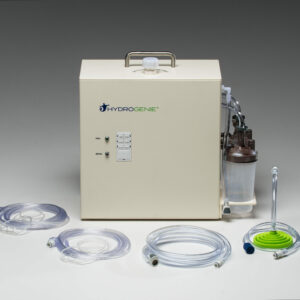
Do you suffer from allergies? Whether spring coming into bloom gives you the sniffles or cuddling with a pet makes your eyes water, allergies are no fun. Moreover, allergies can have a big impact on wellness. In severe cases, allergies can be life-threatening.
According to the Asthma and Allergy Foundation of America (AAFA), more than 50 million Americans experience allergies each year. Allergies are also the sixth leading cause of chronic illness. Furthermore, allergies are responsible for more than 20,000 emergency room visits each year.
A study published in Biochemical and Biophysical Research Communications explains how molecular hydrogen relieves allergy symptoms.
The study in question involved mice. After feeding mice hydrogen-rich water, an immediate-type allergic reaction was completely eliminated. Why did this happen? First, let’s get into a little background on one of the main benefits of molecular hydrogen.
Various studies have shown how molecular hydrogen neutralizes free radicals. Free radicals are unstable molecules that have an unpaired electron. Because electrons like to be in pairs, these molecules try to steal electrons from other cells. This interaction between free radicals and healthy cells leads to things like cell damage and death. And when too many free radicals exist in the body, oxidation stress occurs.
As it turns out, oxidation stress is the cause of or contributor to every human disease. This stress leads to issues like:
When molecular hydrogen (H2) enters the body, it neutralizes free radicals. Free radicals are oxygen-containing molecules. Because H2 has two hydrogen atoms, it donates one atom to the free radicals in order to complete the formula for H2O. Thus, molecular hydrogen neutralizes free radicals by turning them into harmless water.
In the study, researchers noted molecular hydrogen’s benefits when it comes to oxidation stress. However, they discovered that molecular hydrogen’s ability to alter cell signaling was responsible for alleviating allergic reactions in mice.
When it comes to allergies, a major player is something known as FCER1. FCER1 is a receptor that is largely involved in an allergic reaction. The study found that molecular hydrogen’s cell signaling capabilities effectively suppressed FCER1, which inhibited the processes that release the different chemicals associated with an allergic reaction.
This is important because it shows that molecular hydrogen offers many benefits that extend beyond neutralizing free radicals.
In the video below, Tyler Lebaron, founder and executive director of Molecular Hydrogen Institute, talks about the main benefits of molecular hydrogen.
Want to experience the benefits of molecular hydrogen for yourself? Purchase the HydroGenie. This state-of-the-art-generator allows you to experience the benefits of molecular hydrogen in three different ways:
If you want to learn more about how the HydroGenie has enriched lives, check out what our customers have to say.
Finally, if you have questions, our friendly staff is ready to answer your call at (646) 849-9099.
